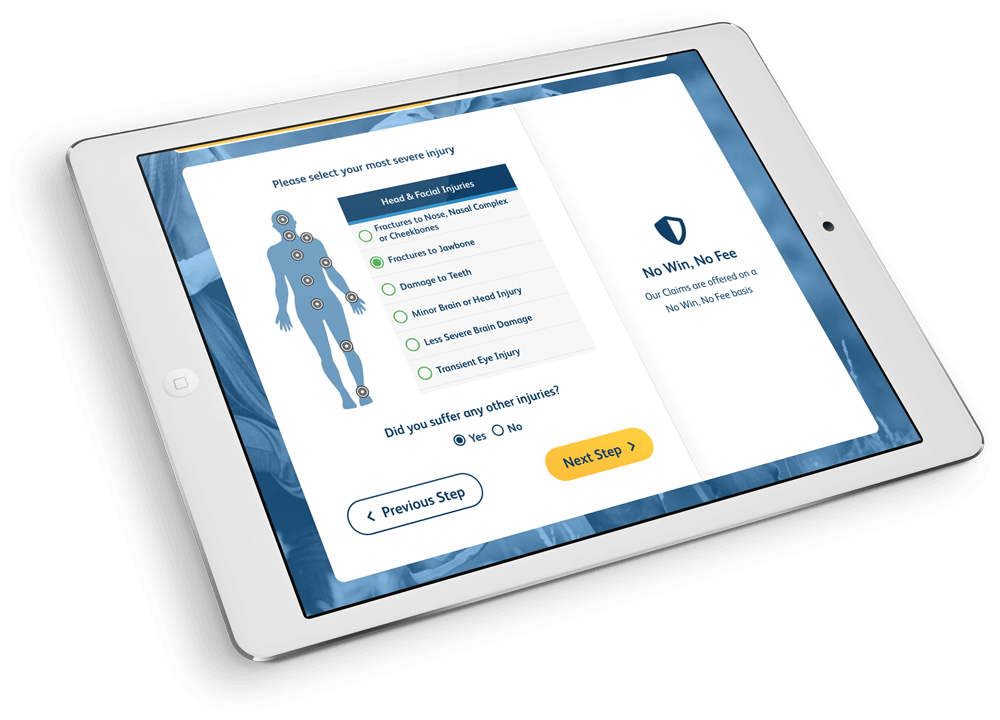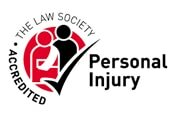
Thanks for your details!
One of our legal specialists will review your details and call you back within 24 hours to discuss this further.
Alternatively to speak to a specialist
for FREE call us now on

Thanks for your feedback!
We take all of our feedback seriously so we can learn what we're doing right, wrong and how we can improve.
If you would like to speak to us regarding your feedback please email us at
As Seen On

Have you suffered from medical negligence?
Claim MAXIMUM medical negligence compensation today…
Services in Medical Negligence Claims
NHS and private medical care is usually very good. Most people will never have a problem with their care. But sometimes things can go wrong.
You should, of course, expect a good level of care, expertise and professionalism when it comes to your medical care. So, when your treatment does not meet the expected standard, you may be left unsure as to what the next step should be. You may have a claim for medical negligence if you can demonstrate:
- that the level of care has been substandard
- that you have suffered recognisable pain, injury and/or ongoing damage, or sadly resulted in the death of a loved one
- that the issues you have suffered are caused or contributed to as a result of negligence by a medical professional
It is vital to find the guidance and support of a qualified and trustworthy medical negligence solicitor to assist you in seeking the compensation that you may be entitled.
Here at Hampson Hughes Solicitors, we look at every circumstance surrounding your medical negligence claim. We listen, we support, and we help to make the process as easy as possible for you. From day one, we look to understand what has happened in order to identify two key points to helping you make a successful case;
- Fault – Our medical negligence solicitors may talk to you about a ‘breach of duty’. Simply, this means that the treatment you received, fell below the standard of a reasonably competent and skilled medical professional.
- Avoidable damage – Your solicitor may refer to this as ‘causation’ and this simply means that the negligent care you received, caused or mentally contributed to harm or death.
What are medical negligence claims?
Medical negligence claims can occur when a hospital, doctor or other health care professional, through a negligent act or omission, causes an injury to a patient. The negligence might be the result of errors in diagnosis, a failure to refer, treatment, aftercare or health management.
When it comes to making a medical negligence claim in the UK, there are likely to be many different questions that you will have with regards to a possible claim. Whether your concern is over whether you can claim, how a claim works, or how to pay for a medical negligence claim, the best way to find specific answers with regards to your claim is to contact an expert medical negligence solicitor who offers legal services.
With this in mind, the team at Hampson Hughes have put together a helpful medical negligence guide. Whether you’re looking into how to claim for medical negligence, the overall medical negligence claims process, or any other aspect of pursuing a medical negligence compensation claim, this offers an insightful starting point. For more information on 10 of the key questions related to medical negligence, read on, while to discuss your claim further, get in touch with us today.
What can you claim for?

Learn More
Injuries
You can claim for any injuries you’ve sustained as a result of medical negligence.
The extent of your injuries; recovery time and the impact these injuries have had on your subsequent quality of life will all be taken into consideration when determining the compensation awarded.

Learn More
Loss of Earnings
Loss of earnings may be awarded where time away from work is authorised by a doctor.
You may also be eligible to claim for loss of future earnings where your injury prevents an immediate return to the workplace.

Learn More
Loss of Enjoyment
As part of your medical negligence compensation claim, you may also claim for any direct impact your accident and injury has had to everyday life.
You may be eligible to claim compensation where your daily activities such as shopping, housework or driving have been affected.

Learn More
Medical Expenses
Medical damages may be awarded to offset the cost of any reasonable and necessary medical treatment required as a result of your injury at work.
Examples include:
- Home visits (e.g. nursing staff, carers)
- Physiotherapy, medical aids, travel costs to and from medical appointments
- ‘Gratuitous care’ – compensation towards the costs of care provided by family
Frequently Asked Questions
-
What is medical negligence?
If you have received care from a medical professional that caused an injury or made your existing condition get worse, then you may have suffered medical negligence – also known as clinical negligence – and could be due compensation.
Medical practitioners have a duty of care to protect their patients from harm. If they fail to exercise sufficient skill, or simply exhibit a lack of care, then they expose their patients to risk. Misdiagnosis, mistakes in surgery and receiving the wrong treatment can all be grounds to pursue medical negligence claims in the UK.
The success of medical negligence compensation claims depends on each claimant’s ability to prove that their care fell below the minimum standard expected of a medical professional. Of course, medical practitioners can get treatment wrong without being negligent.
It is not enough to simply prove that the care was of substandard; we must also establish causation. This means that we must demonstrate that the substandard care has caused or materially contributed to an identifiable injury.
This is a complex process and can be particularly stressful for claimants, especially if they are still suffering from the effects of the medical negligence. That’s why it’s best to seek specialist support from medical negligence solicitors who can bring their full experience and expertise to your case.
-
What are medical negligence claims?
Medical negligence claims can occur when a hospital, doctor or other healthcare professional, through either a negligent act or an omission, causes recognisable injury and/or harm to a patient. The negligence might be the result of errors in your diagnosis, treatment, aftercare and/or health management.
If you explore a medical negligence claim with Hampson Hughes based in Liverpool, from day one we will look to understand what has happened, in order to identify two key points towards helping you make a successful case;
- Fault – Our medical negligence solicitors may talk to you about a ‘breach of duty’. Simply, this means that the treatment you received fell below standards expected of a reasonably competent and skilled medical professional.
- Avoidable Damage – Your solicitor may refer to this as ‘causation’ and this simply means that the medical care you received caused you harm that could have been avoided without the negligent act or omission.
Many people are unfamiliar with the requirements for a medical negligence claim until they experience such an event. Such claims occur when a doctor or other medical professional, through either an omission or a negligent action, causes notable harm or injury to a specific patient. Misdiagnosis, errors in treatment, poor health management or aftercare may all account for the negligence. Once you take on the legal services of Hampson Hughes Solicitors, we will evaluate your possible medical negligence claim to ascertain and identify the two critical points that can help you to make a successful claim.
-
Who can make a medical negligence claim?
Anyone can make a claim for medical negligence compensation; however, the following three criteria must be met:
0800 888 688
Or we can call you back at a time of your choice
Mon to Fri: 9:00am - 5:00pm
Sat to Sun: CLOSED
- You must have sustained an illness or injury or had an existing illness or injury exasperated as a result of medical negligence (as we act for personal injury claimants). You must have suffered a recognisable injury or illness, or have an already existing injury or illness that was exasperated after the medical negligence.
- The illness or injury must be a direct result of someone’s negligence (as we will claim on the defendant’s insurance). The injury or illness must have directly resulted from the negligence of a medical professional, since we claim on the insurance cover operated by the defendant.
- The incident must have taken place in the last 3 years (although minors can claim from 3 years after their 18 birthday). There can be exceptions to this rule, for instance minors can bring their claims up until 3 years after reaching the age of 18 or the 3 years can run from the date of death if the claim is brought by the executor of the estate of the deceased person.
-
What can I make a medical negligence claim for?
Medical negligence compensation is designed to provide reimbursement for a wide range of physical injuries and psychological harm. As such, there are multiple areas in which you may have a claim. “Special damages” refer to any quantifiable financial losses such as medical care, whilst “general damages” cover issues such as pain and emotional distress.
Your suffering itself can be reason alone to claim. This applies even if you have no enduring condition—so for instance, if you were given treatment without adequate anaesthesia. Infections, scarring and nerve damage are all possible grounds for a claim, including the emotional and psychological consequences of medical negligence.
Long-term complications are a significant reason to make a claim following medical negligence. These include claims for ongoing treatment and any equipment or additional care you may need to treat your condition or make it more bearable. This can also extend to any costs for modifying your home (such as ramps, stairlifts, disability aids for the bathroom etc).
The impact on your ability to make a living is also considered, and future earnings can be calculated and factored into any medical negligence compensation. If the medical negligence directly prevented you from enjoying hobbies, sports or other activities that you usually partake in, then you may also be able to claim. This is known as “loss of amenity”.
-
Who can you make a medical negligence claim against?
When it comes to pursuing a medical negligence claim in the UK, you may well be identifying an individual act of negligence by a specific medical professional such as a GP or a surgeon, but you will usually be claiming against the medical service they represent. The majority of medical negligence compensation cases at present will be made against the NHS overall, or an NHS-related service.
Under recent changes enacted in April 2017, the NHS Resolution has three main functions – The NHS Litigation Authority (NHS LA), National Clinical Assessment Services (NCAS) and Family Health Services Appeal Unit (FHSAU) – A primary function of the NHS Litigation Authority is to represent the NHS if you make a claim against them, with fewer than 2% of the cases* handled by the NHS LA currently ending up in court. The rest are usually settled out of court through your medical negligence solicitor, so it is key that you have the right legal support.
As for private practitioners, they are usually insured by private insurance companies and to run their practices, will be required to have insurance cover. Any claim made thereafter will be dealt with by their insurance company, with the medical negligence lawyers at Hampson Hughes able to guide you through making a claim. We have the experience and expertise to offer guidance on the best course of action to take for a No Win, No Fee claim.
*Data taken directly from the NHS LA claims website.
-
How long do I have to make a medical negligence claim?
As detailed in the image section above, there is a general limit of three years for medical negligence claims, with the following qualifications:
- In many medical negligence claims, you can claim up to 3 years after you became aware of the medical negligence, which may give a limit of slightly longer than 3 years from the actual medical negligence itself.
- Should the medical negligence occur on an individual who is under the age of 18 at the time, the limit can be extended to 3 years from the date they turn 18, which again can be somewhat longer than 3 years from the date of the medical negligence itself.
One of our medical negligence experts here at Hampson Hughes will be able to explore the details of your case and advise you on your available time limits in more detail. For now, it is important to get in touch with a trusted medical negligence lawyer as soon as possible, especially if you believe it may be close to the 3 year point.
The effects of medical negligence can last a lifetime, significantly impacting the patient’s general quality of life and affecting areas such as their physical fitness, mental wellbeing, financial prospects and life expectancy and not to mention the knock-on effect on family and loved ones.
However, medical negligence claims are not valid indefinitely. It’s important to understand that they have an expiry. Three years from the date of the negligence is the typical time limit to make a medical negligence claim in the UK or in special cases three years from the date of when you first ought to have been aware that there was an act of negligence.
Normally you must bring the claim as soon as possible after becoming aware of the issue. However, there are exceptions for patients under 18, with the time limit extending to three years from the date they turn 18. There may also be exceptions for those suffering from lack of capacity. It is therefore best to get in touch with a medical negligence solicitor as soon as possible if you have faced a case of medical negligence.
-
What are the common types of medical negligence claims?
Birth Injury Claims, Obstetrics & Gynaecology
Our medical negligence solicitors specialise in helping families in claims involving cerebral palsy, which can happen when a child’s brain is starved of oxygen before or during birth. Obstetrics is a branch of surgery that specialises in pregnancy and childbirth, gynaecology is the branch specialising in the female reproductive system. Disorders or injuries caused by medical negligence during birth can include Erb’s palsy (brachial palsy) and injuries suffered by the mother.
Here at Hampson Hughes, we have a team of expert medical negligence solicitors who can help individuals and families to explore claims related to injuries or disorders resulting from medical negligence during delivery, including a range of maternal injuries.
Brain Injury Claims
Brain injuries caused by medical negligence can have life-changing consequences. Compensation is needed to fund a variety of factors, including long-term treatment, care and rehabilitation. Whether you were treated by the NHS or privately, you may have a medical negligence compensation claim if you have suffered any of the following:
- Brain aneurysm(s); Brain damage; Loss of speech or movement; Memory issues; Meningitis; Stroke; Haematoma or Tissue damage
- Brain injuries resulting in long-term medical care
Medical negligence sometimes result in brain injuries with detrimental outcomes. Compensation helps to finance various factors such as long-term care, rehabilitation, and medical services. Brain injury compensation applies whether you were treated by either a private practitioner or the NHS.
Cancer Compensation, Misdiagnosis or Delay
Receiving a diagnosis of cancer can be devastating in any circumstance. If your cancer was misdiagnosed by a medical professional, or diagnosed later than it should have been, it can be even more damaging. If you have suffered this circumstance, you may be able to bring a cancer compensation claim.
Dental Negligence
Dental negligence claims and orthodontist negligence claims generally fall into three main categories;
- Those around misdiagnosis or a failure to act
- Those in which the dentist’s act is inadequate
- Those whereby a dentist’s conduct is careless
Cancer can be more damaging when a medical specialist misdiagnosis the condition. If you are convinced that you or a loved one have suffered under such situations, our solicitors can help you make a cancer delay or misdiagnosis claim for possible compensation.
Fatal Injury
When someone dies due to an accident or lack of care that wasn’t their fault, their family may raise a fatal injury compensation claim against the responsible party. This can apply whether that is an NHS service, or in many cases a care home where the individual suffered mistreatment that led to their death in the home or in a hospital.
Nobody wants to have to make a fatal accident claim, but it can be vital that dependants claim compensation. It is crucial for emotional wellbeing to pursue such a claim with a highly sensitive and professional negligence solicitor, with our team at Hampson Hughes able to guide you with a hospital, care home or other fatal injury claim.
If your loved one dies due to lack of proper medical care after an accident or illness, you or another close member of your family can look at making a fatal injury claim, in order to secure acknowledgement and compensation against the responsible healthcare specialist or medical institution. Fatal injury claims apply to various settings including NHS medical centres, nursing homes or any other medical care settings. Here at Hampson Hughes, we can offer the support of professional and dedicated medical negligence solicitors to provide sensitive and expert legal guidance to families.
Medical Misdiagnosis
If you have received a misdiagnosis that has contributed to further injury or harm, we can help you pursue a medical misdiagnosis compensation claim. This can be across a number of diagnosis points from different medical professionals, ranging from GPs to surgeons, with cases including misdiagnosis of cancer, misdiagnosis of a fracture, and a range of other medical misdiagnosis situations.
A medical misdiagnosis can complicate an existing injury or even cause severe harm. Our solicitors can assist in making a medical misdiagnosis claim for compensation. Medical misdiagnosis can occur at different points of diagnosis, including with surgeons and GPs. A variety of misdiagnosis cases can happen including misdiagnosis of fractures, misdiagnosis of cancer, misdiagnosis of diabetes, and more.
Orthopaedic Injury
An orthopaedic injury is one which affects a person’s joints, ligaments, muscles, tendons, bones and/or nerves, with such injuries often being very serious in nature. Cases for which you may be able to claim orthopaedic injury compensation may include negligent surgery that has exasperated a condition, or has caused irreversible harm.
Orthopaedic injuries are serious and affect nerves, bones, tendons, muscles, ligaments, and joints. You can bring an orthopaedic injury claim for compensation if you can show that a negligent surgical procedure has caused permanent harm or worsened an existing medical condition.
Spinal Cord Injury
A spinal cord injury (SCI) is damage to the spinal cord that causes changes in its function, whether temporary or permanent. These changes can translate into a loss of muscle function, sensation, or autonomic function in parts of the body served by the spinal cord below the level of the lesion. This injury may occur during surgical procedures in close proximity to the spinal cord, with our medical negligence lawyers able to help you pursue a claim.
A spinal cord injury refers to serious damage to the backbone that causes some changes in the primary function of your spinal cord. The damage can be permanent or temporary, while the changes can result in the loss of sensation and/or muscle functions in various parts of the body impacted by the backbone. Such an injury can happen during a surgical operation performed close to your spinal cord.
Surgical Negligence
If you have suffered an injury, pain, discomfort or serious long-lasting health problems following any surgery you may be able to bring a compensation claim for surgical negligence, alongside the expert legal advice and guidance of our specialist medical negligence team.
If there has been an error during a surgical procedure that has caused additional discomfort, pain, injury or severe and/or long-lasting health issues, you may have cause to pursue a medical negligence compensation claim. Our specialised medical negligence legal experts will provide you with all of the necessary legal guidance, advice and support.
-
How much is your medical negligence claim worth?
The amount of compensation that you receive will depend on the type and extent of the illness or injury you have suffered as a result of medical negligence. We recommend that you speak with a member of our medical negligence team for an accurate evaluation of your claim.
-
What is the average compensation for a medical negligence claim?
Medical negligence cases range from misdiagnosed fractures to serious birth defects. Naturally, there is a huge spectrum of claims to cover the many different conditions, financial losses and forms of suffering. Damages are calculated based on the severity of your case and whether or not you can prove the full extent of each loss.
There are general guidelines and precedents which indicate how much you may be likely to receive from a successful medical negligence compensation claim. Although it’s also worth bearing in mind that no two medical negligence cases are ever the same.
For some cases, such as those arising from minor complications, many claimants have been awarded a few thousand pounds. For the most serious cases, with lifelong consequences, claims numbering hundreds of thousands or even millions of pounds are common. In such cases, the awards may be handled via a trust to ensure the affected party received adequate compensation throughout their life (linked to inflation and changes to the cost of living).
Due to the variables involved, it’s unwise to speculate without proper advice and consultation. You can contact our specialist medical negligence lawyers to discuss your claim and possible compensation amounts in more detail.
We hope that you have found this guide to be a helpful summary of many of the key points related to making a medical negligence claim. The legal team at Hampson Hughes offer an extensive track record in helping clients around the UK to reach a successful outcome in their medical negligence compensation claims.
-
How much does a medical negligence claim cost?
Many individuals are concerned about the possible financial burden of legal costs when pursuing a claim. You may have heard of No Win, No Fee Claims, which in the legal industry are known as Conditional Fee Agreements (CFA). Hampson Hughes Solicitors is able to offer this arrangement to clients in cases where we think it would be in your financial interests. We can help you explore your funding options and work out the best fit.
Some people have existing insurance policies that cover their legal expenses, or access to Legal Aid, but for many others this No Win No Fee model is most preferred. In a No Win No Fee model, we are able to recover most of the legal costs from the defendant, protecting your financial interests. In the vast majority of cases, if your claim is not successful, there are no client costs to pay, hence the No Win No Fee aspect. Once you’ve made contact, if we think we can take on your representation, our legal team will find your ideal funding model.
The thought of potential legal costs may deter many people from instructing a competent medical negligence solicitor to assist them in the process of making a claim. One of the most advantageous claim models for many clients is a CFA, or a Conditional Fee Agreement, also known as a “No Win, No Fee Claim”
Hampson Hughes Solicitors has been offering this funding option to clients in many claims, in order to safeguard the financial interests of our clients. We will assist you to explore your funding options and recommend an arrangement that best suits your needs. This model helps us to recover legal expenses from the defending party, safeguarding your financial interests. In most medical negligence claims, the client does not have to meet the legal costs if case is unsuccessful.
As soon as you contact our legal team, we will be able to explore whether we are able to represent you in making your medical negligence claim and help you choose a funding option that is most suitable for you.
-
How do you gather evidence to support a medical negligence claim?
You may worry about whether or not you have the required evidence to show you have suffered from medical negligence. Hampson Hughes Solicitors can help with this process, as we will request your medical records in order to review and support your claim. However, in further support of your medical negligence claim, you can also:
- Make a note of any visits made to your medical practitioner
- Keep any documents relating to your medical care – prescription orders, receipts, x-rays etc
- Keep all letters from your employer evidencing any lost working hours and income
- Keep receipts for any other out of pocket expenses incurred as a result of your accident, such as taxi fares
-
Which medical practitioners can be held accountable?
All medical practitioners are subject to the same legal obligations and no practitioner is immune when it comes to medical negligence claims.
As long as accountability can be established – by proving the practitioner failed to undertake the minimum accepted standard of care as determined by national standard setting organisations, and their actions directly caused harm – then they may be liable for a claim.
This applies to NHS doctors and private clinics including GP practices, dentists, cosmetic surgeons and opticians.
-
What proof will I need for a medical negligence claim?
The success of your medical negligence case hinges on evidence. This means more than simply being able to demonstrate that you have a condition or injury, you will also need some level of evidence that indicates that the issue was caused by some level of medical malpractice.
Should the legal team at Hampson Hughes take on representation of your claim, we will be here to help you gather the evidence in support of your case. We may need to obtain detailed statements from yourself, as well as family and/or friends, who can provide corroborative evidence for your claim. If you took any photographs, these can help to establish the extent of an injury and when it occurred.
In order to prove your claim, your solicitor can obtain your medical records on your behalf, such as x-rays, ultrasounds and consultations. They will also ask one or more independent medical experts to consider whether the treatment you received was substandard and how it affected.
When all the available evidence has been gathered, your solicitor will decide the best course of action; either seeking to negotiate a settlement or issue legal proceedings.
-
How do you gather evidence to support a medical negligence claim?
You need not worry about whether you have immediate access to the necessary evidence to demonstrate that you are a victim of medical negligence. Your medical negligence solicitor will be able to request and evaluate your medical records as they prepare your claim. Our solicitors advise that helpful evidence to support your medical negligence claim for compensation for injuries, losses and expenses may include:
- Keeping receipts – or at least a record – of any personal out of pocket expenses incurred due to the medical incident, including taxi fares and treatment costs;
- Keeping all correspondence from current or former employers such as payslips that can help to account for any loss of earnings or working hours
- Keeping medical records like X-ray reports and prescriptions, although we should we be able to gain access
- Making a note of all medical visits, although we should again be able to access these.
Claiming medical negligence is your legal right if you have undergone any of the situations mentioned in this guide. Working with competent medical negligence solicitor will provide you with the necessary professional legal advice and guidance required for your claim.
Hampson Hughes Solicitors have offered superior medical negligence claim legal services to thousands of Claimants for many years now. We provide these legal services at some of the most competitive rates in the industry. Working with skilled and dedicated solicitors who have successfully handled thousands of medical negligence claims assures you of the best possible chance of a successful claim.
Our medical negligence solicitors encourage potential clients to consider our “No Win, No Fee” model to seek acknowledgement and compensation or behalf of themselves or a loved one. Here at Hampson Hughes, we believe that every victim of medical negligence deserves quality and affordable legal services, so get in touch with us today by phone, email, contact form or social media, all available on our Contact page.
-
When does your medical negligence claim go to trial?
In almost all cases, medical negligence claims are settled out of court. This saves you the expense of additional legal process and the stress of appearing in court.
Usually it is in both the claimant’s and the defendant’s interests to agree suitable COMPENSATION OUT OF COURT rather than opting for the risk and uncertainty of court. This takes the form of a financial settlement, negotiated by your clinical negligence lawyers and the other side. This is where choosing the best representation really comes into play in helping to achieve the most beneficial outcome.
Medical negligence claims don’t always end in an early settlement though. Sometimes the claimant and the defendant cannot agree on a suitable settlement and one or both parties decides to take the matter to trial. It all depends on the specific details of your case, the relevant field of medicine and any legal arguments. You should be ready for both eventualities, and your solicitor will ensure you are fully prepared to fight your claim in court to successfully claim your full medical negligence compensation.
-
How will I pay for a medical negligence claim?
Most claimants enter into a Conditional Fee Agreement—otherwise known as “no win, no fee”. Under such agreements you will not have to pay any fees unless you are successful and even then you would only be required to pay a limited contribution. The specific nature of your Conditional Fee Agreement will depend upon your unique circumstances. Although these are the most popular means of funding claims, they may not be offered to everyone.
Your insurance policy may cover or contribute to the cost of your clinical negligence claim. Legal expenses insurance can also be taken out to cover your costs.
Private funding is an option for those who are prepared to pay for all their legal costs. Obviously, this is only recommended for individuals who can pursue a claim confidently without worrying about paying fees, especially in the event of a lengthy process.
Trade unions sometimes provide financial assistance to their members in the pursuit claims.
-
How long does a medical negligence claim take?
The typical timeframe is somewhere between 18 months and 3 years (although proceedings can sometimes extend beyond this point). It all depends on the level of injury you have sustained, how complex your complaint is and what position the defendant takes. If they strongly deny liability and causation then expect the medical negligence claim process to take longer.
Your solicitor should support you throughout the process. This can take the form of assisting you in obtaining medical care and helping to make payments for travel costs and other expenses before your claim is resolved. Most cases are resolved before going to court – but if proceedings do begin then a trial date will be set within 12–18 months.
-
What should I look for in medical negligence solicitors?
With a limited time period in which to make your claim, it’s important that you act swiftly. The first thing to do is to engage a solicitor who will explain how to claim for medical negligence clearly and guide you through the process.
You can choose any practising solicitor to handle your claim. But just like procuring any professional service, it’s more beneficial to consult with a specialist who has years of experience in their given field rather than a generalist who only has passing knowledge of your issue. You’ll no doubt want to ensure that your chosen solicitor has an excellent reputation and the highest level of approval from their peers in the industry.
Here at Hampson Hughes, we have a proven track record in dealing with medical negligence claims and you will be in safe hands should you choose to instruct us. Given that you should always look for clinical negligence solicitors with the appropriate qualification and a proven track record in successfully handling claims similar to your own, we believe that this leaves us ideally placed to help you pursue your claim.
Should you believe you have a case for a medical negligence compensation claim, your best course of action is to get in touch with us for a free initial consultation. This will allow you to discuss the details of your case with an expert in medical negligence claims, at which point we will be able to give you an honest assessment of your chances of a successful claim.
Who can make a medical negligence claim?
Anyone can claim for medical negligence injury compensation; however, the following 3 criteria must be met:

You must have sustained an illness or injury or had an existing illness or injury exasperated that is caused by the medical negligence (as we act for personal injury claimants).

The illness or injury must be a direct result of someone’s negligence (as we will claim on the defendant’s insurance).

The incident must have taken place in the last 3 years (although minors can claim from 3 years after their 18 birthday).
Medical Negligence Claims - Specialist Advice
If you have suffered as a result of negligence by a medical professional
Is there a time limit for making a medical negligence claim?
Birth Injury Claims (Obstetrics & Gynaecology)

Cancer Compensation (Misdiagnosis or Delay)
Brain Injury Claims
Fatal Injury

Spinal Cord Injury
Medical Misdiagnosis

Surgical Negligence
Orthopedic Injury
Dental Negligence
There is a general limit of three years from the date of the incident for medical negligence claims, with the following qualifications:
- In many medical negligence claims, you can claim up to three years after you became aware of the medical negligence or ought to have been aware, which may give a limit of slightly longer than 3 years from the actual medical negligence itself.
- Should the medical negligence occur to a child under the age of 18, they have until their 21st birthday to claim.
- Individuals with no capacity, do not have any time limits
One of our medical negligence experts here at Hampson Hughes will be able to explore the details of your case and advise you on your available time limits in more detail. For now, it is important to get in touch with a trusted medical negligence lawyer as soon as possible, especially if you believe it may be close to the three-year point.
What are the common types of medical negligence claims?
How much is your medical negligence claim worth?
The amount of compensation you will receive will depend on the type and extent of the illness or injury you have suffered as a result of medical negligence and the cost of rehabilitation. We recommend that you speak with a member of our medical negligence team for an accurate evaluation of your claim.
How much does it cost to make a medical negligence claim?
Many people are concerned about the possible financial burden of legal costs when pursuing a claim. At Hampson Hughes, we work on a No Win, No Fee agreement. This means that the vast majority of cases are offered on Conditional Fee Agreement, meaning we don’t require any money upfront and our team of specialist solicitors will get to work on your case.

Find out how much you can claim with our compensation calculator
It's really quick and easy, find out in 30 seconds.
See what you're owed!What evidence is needed to support your medical negligence claim?
Hampson Hughes Solicitors will request your medical records in order to review your claim. However, in support of your medical negligence claim, you can also:

Make a note of any visits to your medical practitioner

Keep any documents relating to your medical care – prescription orders, receipts, x-rays etc.

Keep any letters from your employer evidencing lost working hours and income

Keep receipts for any other out of pocket expenses you have incurred as a result of your accident such as taxi fares etc.
What can you claim for?

Injuries

Loss of Earnings

Loss of Enjoyment

Medical Expenses
Medical Negligence Claims - Specialist Advice
If you have suffered as a result of negligence by a medical professional
Why choose Hampson Hughes to handle your medical negligence claim?
Hampson Hughes are experienced clinical negligence solicitors and operating nationally. Our dedicated team of solicitors are committed to securing the maximum possible compensation for our clients.
Our compassionate and experienced team of medical negligence solicitors are experts in this type of claim, offering sympathetic and highly professional advice about your case. We’re proud of our client satisfaction ratings and testimonials and always seek the best possible outcome for every individual we represent.
If you’re looking for medical negligence claims advice and beyond, get in touch with Hampson Hughes today.
The Ultimate Guide to Choosing Your Negligence Solicitor
Claiming for medical negligence can be a complicated process for many individuals and their families and one that requires the services of a legal professional. In order to bring a claim, it must be demonstrated that:
- you have suffered an unnecessary level of pain, injury and/or damage in addition to the original illness or injury
- that suffering can be directly attributed to the negligence of a medical professional
In most cases, the medical services provided by GPs and at Hospitals, both privately and at the NHS, meet the required level. However, sometimes medical negligence claims arise, requiring the affected person to seek support from an experienced medical negligence solicitor.
Hampson Hughes provides you with one of the leading medical negligence solicitor teams in Britain. We have the expertise and experience to guide you through your medical negligence claim, as we have done for many clients in Liverpool, London and across England and Wales. Our solicitors are always ready to listen, analyse and provide you with the necessary support to give the best possible chance of a successful claim.
Some of the common medical negligence claim compensation awards include:
| Claim Area | Type of Injury | Expected |
|---|---|---|
| Paralysis | Quadriplegia | £284,610 to £354,260 |
| Paraplegia | £192,090 to £249,270 | |
| Brain damage | Less severe brain damage | £13,430 to £37,760 |
| Moderate brain damage | £37,760 to £192,090 | |
| Moderately severe brain injury | £192,090 to £247,280 | |
| Very severe brain damage | £247,280 to £354,260 | |
| Injury affecting sight | Minor eye injury | £3,460 to £7,650 |
| Minor permanent damage to vision | £7,990 to £18,390 | |
| Complete loss of vision in one eye | £43,200 to £48,080 | |
| Total blindness | In the region of £235,630 | |
| Total blindness and deafness | In the region of £354,260 | |
| Impairment of taste and smell | Loss of smell | £21,190 to £28,860 |
| Loss of taste | £16,830 to £21,910 | |
| Total loss of taste and smell | In the region of £34,340 | |
| Post-traumatic stress disorder | Less severe post-traumatic stress disorder | £3,460 to £7,170 |
| Moderate post-traumatic stress disorder | £7,170 to £20,290 | |
| Moderately severe post-traumatic stress disorder | £20,290 to £52,490 | |
| Severe post-traumatic stress disorder | £52,490 to £88,270 |






